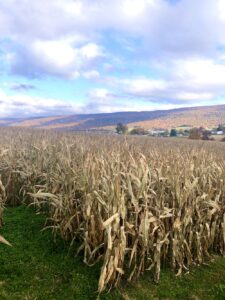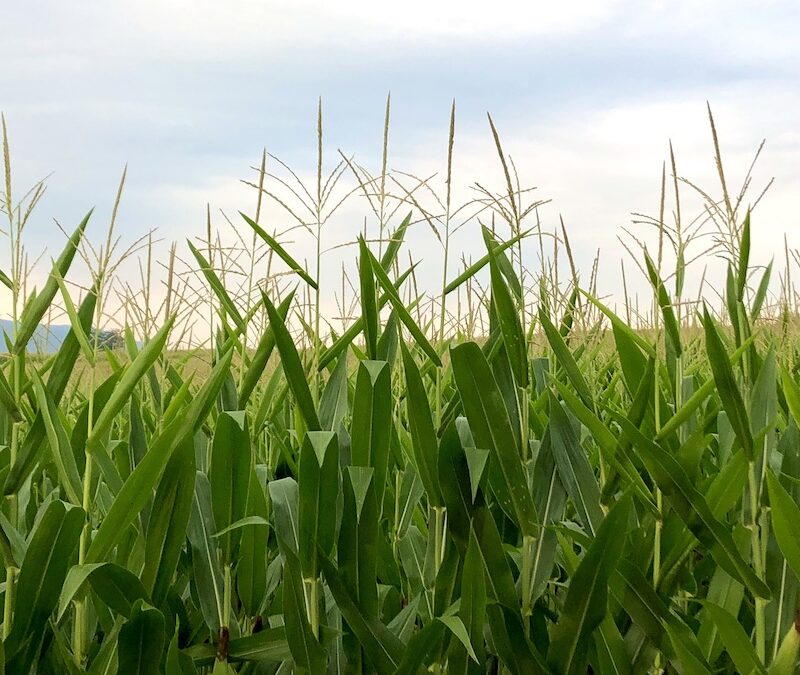Thank you to our farmer-neighbor whose life’s work was tending the fields I see and admire every day as they change colors and textures with the seasons. May your heaven be free of worry and full of ease and good land.
For a stretch of warm, humid August days, a fragrance enveloped me as I stepped out behind our house at dusk. The scent, pleasantly light, green and sweet, reminded me of fresh-cut hay. But it was not. Nor was it the scent of fresh-cut oak slabs my husband splits in the summer and stacks out back into a tidy, sturdy pile to cure for winter.
That aroma of green firewood reminds me of pickles. Or maybe pickle barrels.
Either way, this mystery scent was different. Sweet and ripe.
Ripe is my best word for August in Central Pennsylvania. The soil’s richness reveals itself in a burst of delicious, flavor-packed peppers, tomatoes, melons, cucumbers, peaches — and more treasures over-flowing at farm stands. The fields and grasses, trees and crops all ripen into deep, sugary greens.
My nose led me into our backyard, toward the mountain ridge where the sun rises. Then into the grassy cemetary behind our woodpile and to its fenced rear boundary with the cornfield beyond, where thousands of yellow ears upon bright green stalks in perfect rows hug the swells and contours of the land.
It was the corn, ripe and bursting with sugars from the alchemy of rain, sunshine and carbon dioxide. Had I never noticed this scent before in the decade since I’ve lived here? Perhaps the ripe corn in this field has never been quite so sweet and strong.
Or, maybe my mind was playing tricks, working its way through a loss.
Unfinished Work
In mid-August, the farmer who planted this corn and tended these fields died suddenly in his late 50s. I don’t know many details, nor would they be mine to tell.
We spoke twice. Once when a neighbor and I returned his friendly farm dog that had wandered off the farm and up to our house, near the busy road, and once on a spring Saturday as he prepared to plant this field.
We talked about the land, our worries about America and just a bit about my work with a land trust that preserves farmland.
“He was passionate about farming and loved to see things grow. He was an excellent caretaker of the land,” says my neighbor-farmer’s obituary.
I hope I told him how beautiful his fields are to me, and how much I appreciate seeing them every day in every season, from the mucky browns of spring to the velvet green of August.
But I can’t be certain. I looked ahead to future conversations, not realizing that would be our last.
These Fields of Gold
A season later, the farmer was gone. The last crop of cornstalks he planted turned brown and brittle. In October, the stalks became a papery, pale gold blanket stretching along the valley bottom to the horizon. Fields of gold.
I remembered my friend, Lee, a beautiful, fierce and strong woman who loved the sea and taught me so much about loss and life. Lee, like my neighbor-farmer, died in mid-life. Unfinished.
So many miles to go — or so we thought. She had some warning and planned her funeral, a reminder to me even now of her strength.
In a little church in Boothbay Harbor, Maine, according to Lee’s funeral plan, a lovely friend of hers sang an a cappella version of “Fields of Gold,” Sting’s song from the 90s. Such a beautiful song. (You’ll find a YouTube link to it at the end of this post.)
I think of Lee, especially when I hear the lyric.
You’ll remember me when the west wind moves
Upon the fields of barley
You can tell the sun in his jealous sky
When we walked in fields of gold
When we walked in fields of gold
When we walked in fields of gold
Lee helped me learn to accept loss as a part of life, and to let that reality enrich my life, inspire me to fully live.
Lee would say we all know deep down how to grieve our losses, that to help a friend or neighbor who is grieving means to quietly honor their process, what they already know how to do. We don’t need to find a reason, or the silver lining.
This morning, a thin layer of white frost covered the grass beside the fields and crunched below my feet as our dogs sniffed and snuffled. Another farmer harvested the corn in October’s final days, machinery humming into the night.
Season of Remembrance
November has arrived with its wash of gold, gratitude and clarifying light. (Read November’s Light Offers Rich Reminders of Love and Loss.)
The season of remembrance is upon us, reminders of loss in the falling leaves, the emerging browns in the landscape. We’ll gather in two weeks over a rich feast to celebrate gratitude, family and abundance. Many families will be keenly aware of who is missing. I am thinking now of my family-of-origin. We lost a man with a big heart, who died before reaching mid-life. Unfinished. A son, cousin, nephew, brother, husband, father.
This life moves so swiftly. It is so temporary. And yet, what we do and how we live matters.
Every morning, when I walk back to the edge of my farmer-neighbor’s field and look over the rolling layers of greens and brown that stretch to the base of the mountain, I feel rich and lucky. Fields of gold surround me here, reminding me to live and love, big and full, and of the inevitable losses woven into each of us. My conservation-science brain recognizes monoculture and is aware of its hazards. Our whole world needs more biodiversity to survive. And yet, these fields and the caretaking and love of land they represent are nonetheless beautiful to me.
To watch as the trees on the mountain reveal the seasons, and reflect that morning’s pattern of clouds and light anchors me as did the currents of the Kennebec River near the Maine coast, reminding me to breathe it all in, and of my small part within the natural order.
I stand in awe of farmers who tend the land and feed us, body and soul.
Thank you to our farmer-neighbor who spent so much of his life tending the fields I admire every day. May your heaven be effortless, worry-free and full of good land. Fears of drought or flood, wandering dogs or the cost of fuel can’t touch you now.

